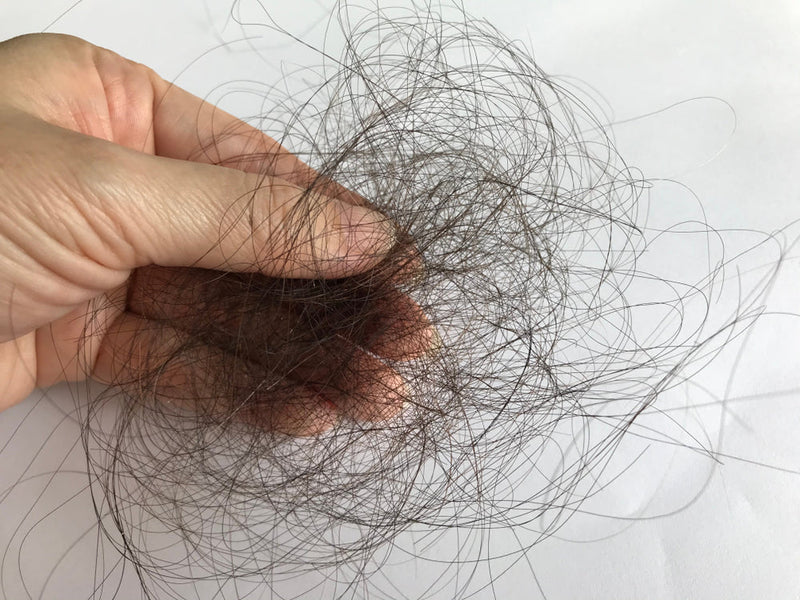You're doing everything right. You're watching what you eat, maybe even taking a hair vitamin. But you're still finding too much hair in your brush, in the shower, on your clothes. It's frustrating and confusing. You start to wonder, "What am I missing?"
Often, the answer is hiding in plain sight—or rather, in what's missing from your plate. We talk a lot about iron and biotin, but let's talk about a mineral that doesn't get enough airtime: potassium. If your hair is thinning and you can't figure out why, this might be your missing link.
How a Simple Mineral Deficiency Triggers Hair Shedding
So how does not getting enough potassium lead to hair loss? It all comes down to a delicate balance inside your body.
Think of your hair follicles like tiny, delicate plants. They need a perfect environment to grow. Now, imagine salt (sodium) building up in that soil. When your potassium is low, sodium starts to accumulate around your hair follicles. This creates a toxic environment that blocks your hair from absorbing the other nutrients it desperately needs—like iron and zinc.
It's like your hair is starving, surrounded by food it can't reach.
This nutrient blockade is a major stressor on your body. That stress can shock your system and push a huge amount of your hair into the shedding phase all at once. This condition is called Telogen Effluvium, and it's one of the most common reasons we see diffuse thinning in women.
The tricky part? This doesn't happen overnight. A potassium deficiency can quietly build for three months or more before you ever see a single strand fall out. The hair loss you see today started months ago.
Signs Your Potassium Might Be Too Low
Hair loss is rarely the only sign. Your body usually sends up other flares first. Have you been feeling any of these?
-
Unexplained fatigue that just won't quit
-
Muscle weakness or those random, annoying cramps
-
Trouble sleeping through the night
-
Heart palpitations or a feeling that your heart is fluttering
-
Tingling or numbness in your hands and feet
If this list is sounding a little too familiar, it might be time to look deeper. At Nina Ross Hair Therapy, this is where our functional medicine approach shines. We don't just guess. We use comprehensive lab testing to check your mineral levels and see what's really going on beneath the surface.
The Right Way to Fix Potassium Deficiency for Hair Growth
Okay, so you think potassium might be the issue. The internet will tell you to "eat more bananas." And yes, food is a great foundation. But when you're dealing with a deficiency that's already causing hair loss, you often need a more targeted strategy.
1. Food as Your Foundation
Loading up on potassium-rich foods throughout your day is key. Don't just have one potassium-packed meal. Spread it out.
-
Fruits: Melons, bananas, apricots and peaches
-
Veggies: Spinach, kale, mushrooms, broccoli and sweet potatoes
-
Proteins: Salmon, turkey, chicken and beans like Lima and black beans
-
Other Sources: Brown rice and even dried fruits like figs and raisins
2. Smart Supplementation
Here's the truth we see every day: diet alone isn't always enough to reverse a significant deficiency, especially if gut issues are preventing proper absorption. This is where medical-grade supplements make all the difference.
Our Nina Ross Potassium + Magnesium Capsules were designed for this exact problem. We pair potassium with magnesium and D3 because these nutrients work as a team. Magnesium helps your body actually use the potassium, and D3 supports overall follicle health. This isn't a random mix; it's a strategic formula to correct the imbalance and create the ideal internal environment for hair growth.
Why a Quick Fix Won't Cut It (And What Will)
Listen, reversing hair loss from a nutrient deficiency isn't an overnight process. If it took months for the deficiency to cause shedding, it will take time to replenish your stores and for your hair cycle to reset. The good news? This type of hair loss is almost always temporary. With a consistent all-round approach, you can expect to see your hair growth return to its normal, healthy rhythm within six months.
The key is knowing for sure. Is it really just potassium? Or is it a combination of factors like hormones, other nutrient deficiencies and inflammation? That's the clarity we provide.
Tired of Guessing What Your Hair Needs?
You're done with the guesswork. You're ready for answers. If you're in Atlanta and tired of wondering why your hair is thinning, book a Hair Therapy Evaluation with us for just $99 and let's find the root cause together.
We'll sit down with you, review your history and use advanced diagnostic testing to look at your mineral levels, hormone balance and overall scalp health. No more guessing. Just a clear, personalized plan to get your health and your hair back on track.












